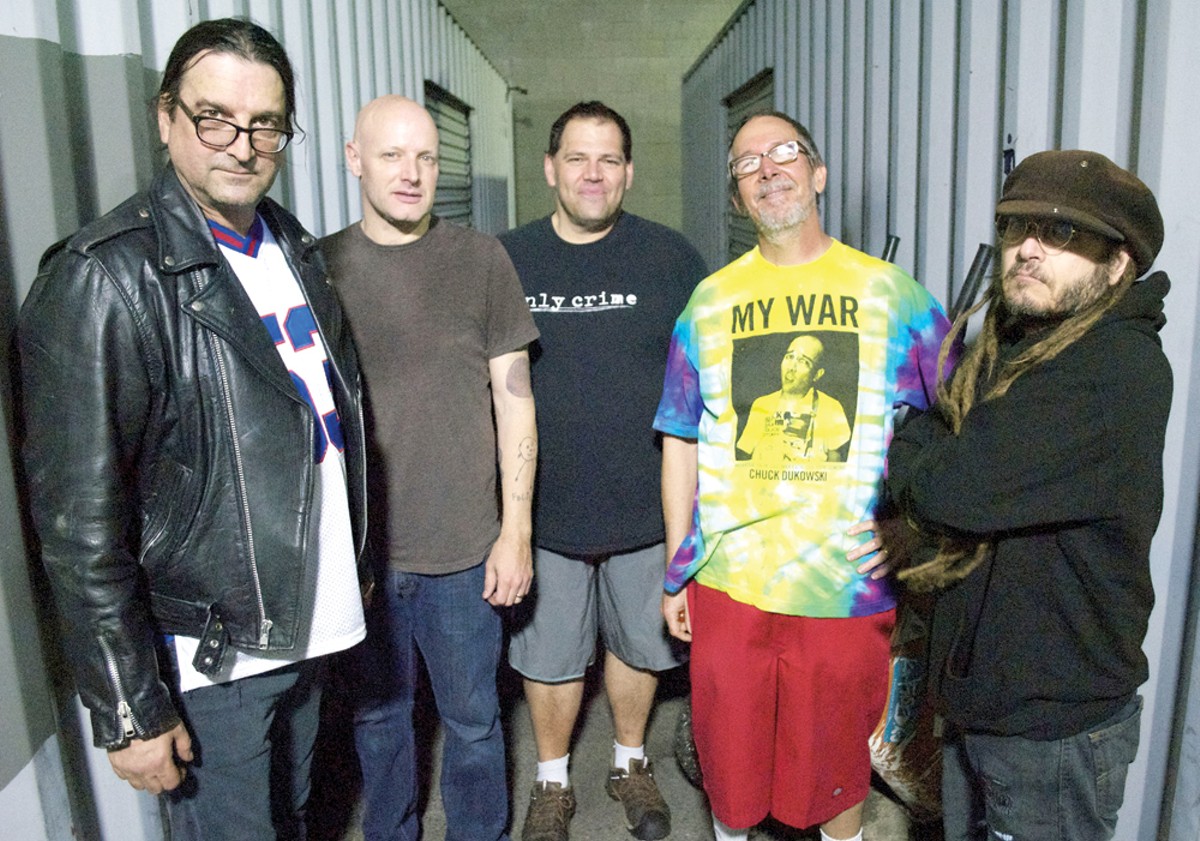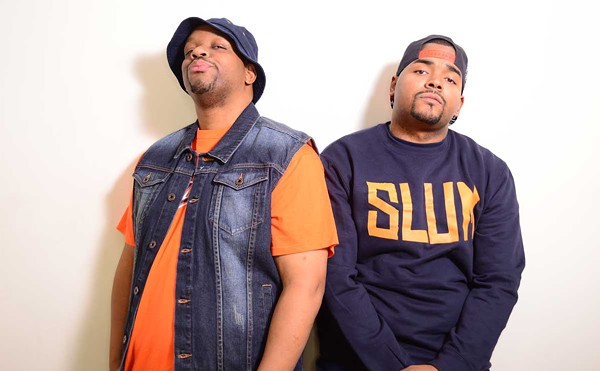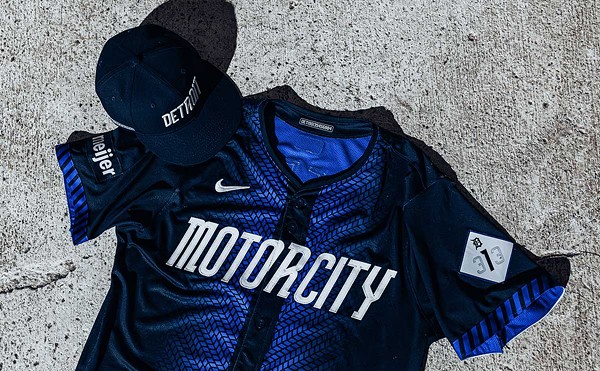Historians of punk — and rock music more generally — often compartmentalize genre styles using both geography and chronology. The Los Angeles punk scene, for instance, is typically divided into Hollywood, the South Bay, East LA, Orange County, and beyond. It's often said that the violence of hardcore music created a schism in the LA punk scene of the late '70s, and maybe the music can be said to inhabit different worlds entirely: one populated by infectious hooks and throwbacks to classic Americana, where we're out there having fun in the warm California sun; and a separate one in which the man behind the California sound is actually tortured by psychotic episodes, and spends his free time hanging out with Charles Manson. The music, art, and what has sometimes been described as the movement associated with the band Black Flag belongs to that second world.
The band's own history is often divided up by singer. In 1979, they released their first EP, titled Nervous Breakdown, which served almost as a manifesto. The single featured some of the greatest songwriting by guitarist and chief architect Greg Ginn, as well as classic album design by his brother Raymond Pettibon, who would go on to produce not only Black Flag's logo and the majority of their artwork, but iconic covers for the likes of the Minutemen and Sonic Youth. The incredible third ingredient on Nervous Breakdown is the singing of Keith Morris, who reportedly showed up to play the drums, until coaxed into vocals by Ginn.
Morris' vocal work is perhaps the most distinctive of any of the Black Flag singers, a sound that some have likened to the whiney snarl of Johnny Rotten. Every fan of Black Flag has their favorite vocalist. But the fact remains that the magic formula that came together on Nervous Breakdown produced a masterpiece.
After touring around California and recording Nervous Breakdown — along with a handful of other classic Black Flag tracks that would not resurface until 1982's double LP Everything Went Black — Morris left the band to form his own hardcore supergroup, the Circle Jerks. The Circle Jerks would appear alongside Black Flag and their new singer Ron Reyes in Penelope Spheeris' The Decline of Western Civilization Part I, which immortalized the names and faces of the LA punk scene on the silver screen. Reyes would be eventually be succeeded by Dez Cadena, and finally Henry Rollins, who would find fame and fortune not only in his post-musical acting career, but also in telling the story of Black Flag to readers and audiences around the world.
After their breakup in 1986, the band remained inactive for almost three decades, until a watershed moment for Black Flag's music came in 2006. That year, normal teenagers across America were tuning in to watch one of Fox's most popular prime-time dramas, The OC. Actor Adam Brody's character had been rejected from the college of his choice, and adopted a bleak, almost nihilistic outlook on his prospects for the future. The scene opens with Brody alone in his room, so despondent and hopeless that the once upstanding young citizen has taken to smoking marijuana. The song he is listening to is one whose lyrics were penned by Morris, an early tune originally hailing from before Black Flag's first recording session when the band called themselves Panic. It was "Wasted," from Nervous Breakdown.
The use of punk and hardcore music in mainstream American media like The OC is significant, or at least interesting, for a number of reasons. It illustrates the extent to which the music itself has become synonymous with the angst, anxiety, and malaise of adolescence. But also, it marks a renewed popular interest that may spell good news for casual and dedicated fans alike. Sure enough, in 2009 Morris formed OFF! — his second band to share its name with a popular brand of insecticide. OFF! blended the sound of early Black Flag with some of Morris' favorite proto-punk acts, and was also accompanied by original artwork from Pettibon.
Then, in early 2013, Ginn announced that Black Flag had re-formed with a lineup that featured Reyes on vocals. And shortly after, Morris announced his own intention to perform the songs of Black Flag with former members Dez Cadena on guitar, Bill Stevenson on drums, longtime bass player Chuck Dukowski, and their friend Stephen Egerton of the Descendents filling in as lead guitarist. The group performs under the name FLAG.
The night before I speak to Morris on the phone, his friends John Doe and Exene Cervenka of the band X appear on NPR's Fresh Air. The pair are promoting their new book Under the Big Black Sun, a self-described "personal history of LA punk," which features chapters by Henry Rollins, Jane Wiedlin of the Go Go's, and Mike Watt of the Minutemen, among others. Morris is quick to direct my attention to a photo of himself alongside Black Flag members Ginn and Dukowski, which appears midway through the book. But Keith's story behind the photo does not appear within the pages of Under the Big Black Sun.
"What happens is, after we get through with the photo shoot, Greg says something to Chuck, or somebody says something to somebody else," Morris says. "And Chuck ends up getting pushed through one of the big plate glass windows. This was up on Hollywood Boulevard in front of Frederick's of Hollywood, where your gal pal would go to get some lingerie and negligee and things that would turn you on and stimulate you, all of those fun things."
Morris' own memoir is called My Damage: The Story of a Punk Rock Survivor, and is set for release from Da Capo on Aug. 30. The book is co-authored by Southern California writer Jim Ruland, a longtime contributor to Razorcake, as well as the now-defunct and revered LA punk 'zine Flipside. The book's title refers not only to Black Flag's music, but to the toll Morris' career has taken on him, as throughout our conversation he references a number of medical conditions including diabetes, and problems with his lumbar spine and respiratory system. "I have emphysema," he says. "I already smoked all the weed I'm destined to smoke."
The harsh realities of a failing body and nervous system are one of the many factors that can complicate things later in life. And one of the ideas I am most interested in talking to aging punk legends about is how their attitudes change. While the public's perception of punk has undoubtedly shifted, it's unclear how much that shift has to do with the audience, or the musicians themselves. Writer Chuck Klosterman (who ironically, has never been interested in punk) was one of the first I heard talk meaningfully about the idea of authenticity — the extent to which young people are preoccupied with remaining authentic. As we age, and we accept that we will have to accommodate the world around us, this tends to become progressively less important.
The music of Black Flag is perhaps some of the most "real," visceral music ever produced, to the degree that it is almost difficult to listen to anything else afterward. Songs like "My War" are the best illustration of this, and "Depression" is perhaps so evocative of the emotion it should be included in an etymological discussion of the word itself (as writer Richard Meltzer suggested was the case with X's "Nausea"). As we grow older, we are not only forced to accept the world around us, but in doing so, we become more self-aware. Speaking to Morris from his home in Los Feliz, it seems pretty clear that the music he now performs with FLAG emerged from a nearly adolescent lack of self-awareness.
"When we were making this music, we had absolutely no idea as to what we were doing," Morris says. "We just got in the room and I guess the best way to describe this was all of the feelings that we had going on, growing up, and some of the events and some of the things that were taking place around us was part of chemistry, was part of the program, was part of the — oh, geeze — the formula.
"If you were to go to a party, we would be the last ones that anyone would talk to except for the rest of the nerds that were there. It's kind of like Sixteen Candles: We were all working jobs we didn't want to work. Some of us were struggling in the female department. All of the stuff had been part of the ingredients to what we created. Consequently, the music was very angry. It was like we were lashing out. We weren't rocking out to get laid. We weren't rocking out to score drugs. We weren't rocking out to be the popular guys. We were lashing out at all of the people that had pointed their fingers at us ... We didn't know any better."
Likewise, he offers a similar explanation for Black Flag's famously relentless work ethic. "We didn't know about posing, or posturing," he says. "We didn't know you had to look like this to be like that, to be able to play over there. We didn't know any of that. We didn't know that you'd record three or four songs and put them on a cassette and go to the club and seek out the person that booked the talent, or the owner of the club, and give them what we would call a demo. We didn't know that. We didn't know that was the way you did it. We just pestered people."
In the '90s, as the next generation of bands that Morris inspired found a home on top 40 radio, fans of the music were quick to label anyone who found commercial success a traitor. Since then, his contemporaries like the Dead Kennedys have faced criticism for licensing their music for use in advertisements. I am always curious to learn more about the decision-making process. When I spoke to Chris Moore of Negative Approach for Metro Times last month, he told me it was not simply a matter of the musicians aging, or the way audiences perceive punk and hardcore, but also changing patterns in the way music is consumed. "If you were to have asked me this 10 years ago, I would have said, 'No way; I'm going to license anything,'" Moore says. "But now I would be like, wherever I can grab a couple of bucks from any music that I'm working on, I'll pretty much do it, unless it's going to something that's going to hurt people. No one really makes any money off of music anymore in terms of sales, so you gotta find it somewhere else — performance, licensing, whatnot."
Morris' explanation is simpler, and he cuts me off mid-sentence: "It's called rent!" he says. "It's called having to have health insurance and auto insurance, all of that fun stuff. It's called being an adult. When we're younger, we can run around and throw bricks through windows, or burn stuff down, or overturn police cars, and join the riot, and all of that fun stuff. It's a reward for the people who made the recording in the first place, and all of the years that they've got out there in the van. And played in front of three people. Or played in front of 30 people all of these years. It's a reward. Why shouldn't a great musician that's written an amazing song be able to pay their bills?"
Morris tells me there is a popular rumor flying around LA — created by a shadowy organization he refers to as the "punk rock ethics committee" — that he owns a Beverly Hills mansion, filled with ornate fountains and European sports cars, which he occasionally rents out as a location for rap videos and pornographic movies. He is quick to dispel this, but tells me he has long fantasized about obtaining a large piece of property in West Los Angeles for the purposes of creating an encampment for the city's homeless, like a sort of gated tent city. His guests would be free to camp out in the backyard or front lawn, hold movie nights in the living room, or bathe in the fountain. "The swimming pool would be the same situation. It would just act as a giant bathtub," he says, "as opposed to a giant urinal."
Appearing on Marc Maron's podcast last year, Mike Watt (of Black Flag's South Bay neighbors the Minutemen) claimed that one of the factors that tied many of the LA bands together, irrespective of geography, was a shared love for the Stooges. Everyone secretly considers their city to be the center of the universe, so in exchanging emails with Black Flag bassist and onetime SST label manager Dukowski, I can't resist asking whether he thought of Iggy and Co. as a punk rock band per se.
"Definitely," he says. "Even before English punk happened, there was a small group of people who liked more extreme music of various sorts. The Stooges were one of the most extreme. It's funny in today's context to say that, but in the [mid-1970s] context it was real true. I got my copies of the first Stooges album and Fun House from classified ads, because they were unavailable new or used in stores out in LA. I remember getting interested in the Stooges because Fun House was named as the worst record of the year when it came out. After that, I was on the lookout for anything Stooges."
Morris' opinion diverges slightly. "Would I consider the Stooges to be a punk rock band?" he says. "I consider the Stooges just to be an amazing, loud, abrasive rock and roll thing." But today, he still holds them in the highest regard. "I think that the Metallic K.O. album, one of their last live performances, is one of the greatest live recordings ever. It's one of those records that gets placed up there next to the Who's Live at Leeds, or the Rolling Stones' Get Yer Ya-Ya's Out!"
The image of the black flag is often associated with the political doctrine of anarchism, but the music of Black Flag could best be regarded as post-ideological. Songs like "White Minority" are clearly written from a satirical perspective, and assume an even greater irony when sung by Puerto Rican-American singer Reyes. But their work explores some of the darkest territory imaginable, so much so that my own love for Black Flag almost makes me uncomfortable at times. In a year when Kanye West's latest album was canned by some critics for its misogyny, it is interesting to consider how songs like the Rollins-era "Slip It In" would be received today.
But at 60, having accumulated decades' worth of punk rock damage, Morris leaves me with some parting wisdom you'd never hear from the young men and women depicted in The Decline of Western Civilization. "Be a good human being," he says. "Do good things for other people, and hopefully they'll do good things for you."
FLAG plays with the Dirty Nil and Off With Their Heads at Small's on Thursday, June 9; Doors at 7 p.m.; 10339 Conant St., Hamtramck; smallsbardetroit.com; the show is sold out, so check the resale circuit for a ticket.






